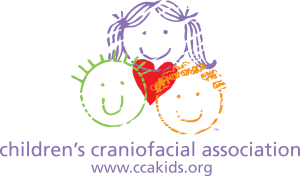The Children’s Craniofacial Association is an American organization that our family has followed since our child was born with facial differences. Their mission is to empower and give hope to individuals and families affected by facial differences. You can check out more of their amazing programs and wealth of information here: https://ccakids.org/
One of the programs/events they host is an annual family retreat and educational symposium. Much like Hands & Voices, they believe that bringing together families with extraordinary children builds incredible bonds and fosters camaraderie and helps all families feel empowered by those connections.
We’ve never been able to attend a retreat in person for a myriad of reasons but this year COVID handed us a silver lining when CCA decided to cancel their in person retreat and host a virtual retreat instead. The two full day schedule was jam packed with interesting and relevant topics for our family, but I’d like to share some notes I made from one of the most useful workshops I attended, the Parent Panel – IEP focus. For those of you who still have young children your child may not yet have an IEP (Individual Education Plan).
An IEP is a document that is built in collaboration with the school, those that work with your child and you. It contains goals and strategies to help your child learn, services and resources that your child needs to succeed in school, and ways to track progress.
The workshop was hosted by 3 veteran parents who shared their tips for parents new to IEP collaboration meetings.
- Try to attend your meetings with a partner/friend or family member who can take notes for you while you focus on advocating and sharing needs or requests. IEP meetings can sometimes cause us as parents a lot of anxiety, which in turn causes us to get emotional or feel rushed. Having a partner there can greatly help with that.
- Remember YOU ARE THE EXPERT! No one else knows your child as well as you, so be confident.
- Document every interaction you have with your team.
- Directly related to the above is creating an IEP binder. See a great blog post here about how to do that: http://www.ccakidsblog.org/2013/11/educational-advocacy-part-five.html
- Establish a clear home/school communication method that will work for everyone.
- For example, a written notebook that can go home each day with your child can be extremely useful. You also need to remember to write in the notebook to keep your child’s team updated of things happening at home. The benefit of this method is that it also creates a paper trail of your interactions with the school.
- Consider writing your own “parent report” to bring to each meeting. This report is equally as important (if not more so) than the other reports you may bring to meetings such as audiograms, speech language pathology reports, physio or occupational therapy reports. Use your parent report to give updates about how services are impacting your child (both positive and negative). Be very specific.
- The speakers referenced the following blog post about how to write your own parent report: http://www.ccakidsblog.org/2013/10/educational-advocacy-series-part-four.html
(Also note this article on the BC Hands & Voices website that has a template you can use for a one page sheet you can modify for your child’s team: https://www.bchandsandvoices.com/post/a-helpful-tool-for-people-supporting-your-dhh-child/)
- The speakers referenced the following blog post about how to write your own parent report: http://www.ccakidsblog.org/2013/10/educational-advocacy-series-part-four.html
- After meetings try to follow up with an email with a quick summary of what was discussed.
- Plan ahead – make sure you’re making long term and short term goals
- Accommodation requests are often best received if you have assessments that can prove the need. You can do this in two ways;
- If the school’s assessment doesn’t show a need, you can always get an independent assessment from a third party.
- Collect your own data to show. Both show that you’ve “done your homework”.
- Some areas that these parents noticed were sometimes left out of their children’s IEPs:
- Playground safety
- Environmental adaptations (sound modifications for example)
- Accommodations to encourage self-independence
- Socioemotional needs and goals
- What other enriching activities are available and are they accessible to your child? If they’re not – find ways with the school to modify what they’re offering so that it’s accessible to all students.
- Mental health – consider adding a mental health professional to your team.
There was an amazing amount of information shared in the workshop and it was an overwhelmingly positive experience. I felt better informed and ready to take on my child’s next IEP meeting. COVID-19 has brought uncertain times and perhaps an even greater need for cooperation between parents and professionals. Our children’s IEPs are going to be very important for this upcoming school year. I hope this information will be helpful and give you some more tools for advocacy.
More information on IEPs can also be found here:
BC Confederation of Parent Advisory Councils https://bccpac.bc.ca/index.php/resources/39-inclusive-education/45-individual-education-plans-a-guide-for-parents
INSOURCE Special Education Parent Support (US based)
http://insource.org/resources/iep-meetings/
This website has a wealth of great information for any and all topics about IEPs including how to improve your child’s existing IEP and talking points to advocate for your child: http://insource.org/resources/iep-meetings/endrew-f-worksheet-for-improving-your-childs-iep/


